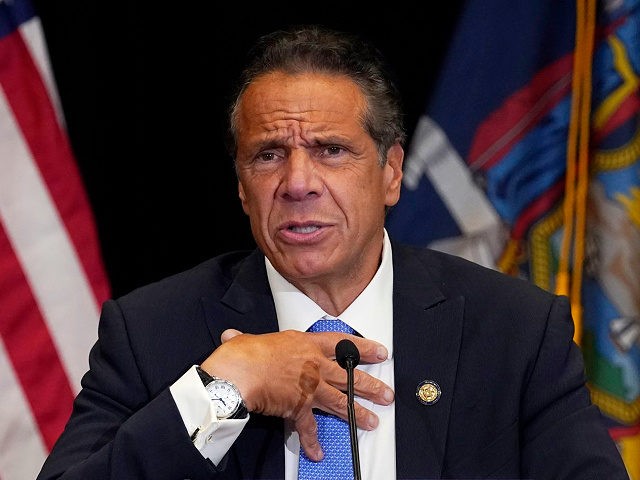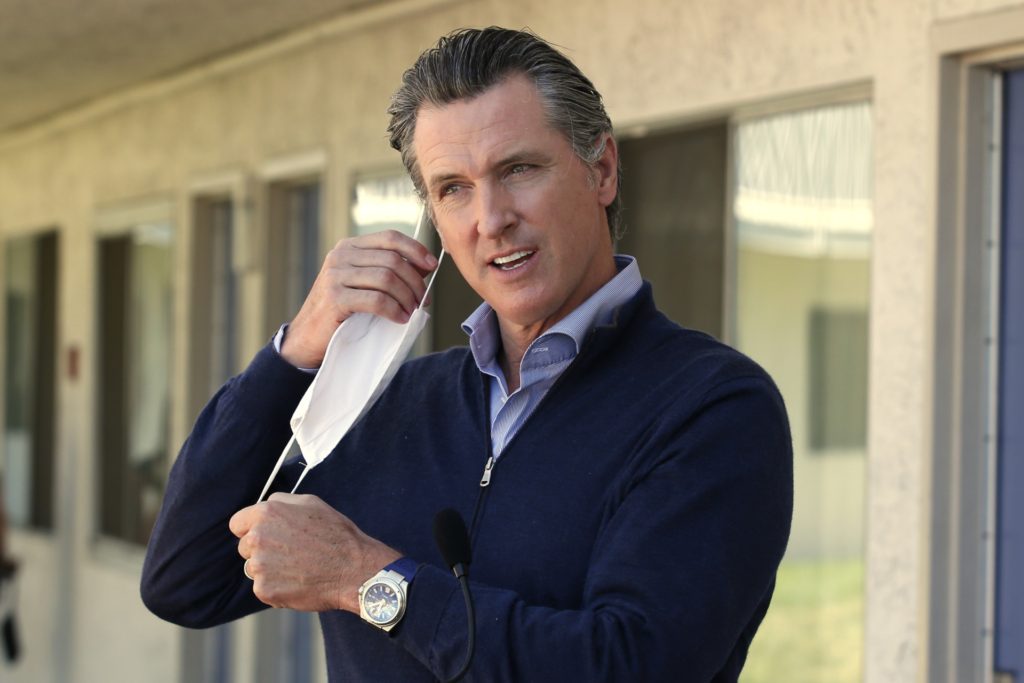IT'S NOT HARD. THE ENTIRE REASON THE BORDERS ARE WIDE OPEN AND JOE BIDEN IS SCATTERING 'CHEAP' LABOR ILLEGALS ALL OVER AMERICA IS TO KEEP WAGES DEPRESSED. IS IT WORKING?
Surviving an Unlivable Wage | Full Documentary
What Happened To The American Middle Class? | Financial Crash Documentary | Business Stories
Don’t be fooled by Joe Biden
Chris Hedges | NAFTA, Clinton, and Obama BETRAYED Americans... and Joe Biden was right there with the worst of them!
Cuomo’s Downfall Foreshadows Potential Looming Problems for Democrat Governors Nationwide

New York Gov. Andrew Cuomo’s (D) resignation might not stop the bleeding for Democrats in governors’ mansions nationwide facing problems of their own.
California Gov. Gavin Newsom (D) is on the ballot for a recall in five weeks in the Golden State, with polls signaling a potentially close race, while Michigan Gov. Gretchen Whitmer (D) faces corruption problems of her own in the upper Midwest.
If it succeeds, the second-ever recall election of a California governor — the first was Gray Davis, another Democrat, who lost and was replaced by Republican Arnold Schwarzenegger a couple of decades ago — would likely set off an avalanche of national problems for Democrats with governors’ races later this year in Virginia and New Jersey representing pickup opportunities for Republicans. The last time a Republican won the governorship in either state was immediately after the last Democrat president, former President Barack Obama, was sworn in — meaning with Democrat President Joe Biden in the White House right now, history is on the GOP’s side in both states.
Next year’s midterm elections also present a bevy of pickup opportunities for Republicans at the governor level, with Pennsylvania Gov. Tom Wolf (D) term-limited out of running for reelection. Republicans, meanwhile, are targeting Wisconsin Gov. Tony Evers (D), Kansas Gov. Laura Kelly (D), New Mexico Gov. Michelle Lujan Grisham (D), and others nationwide.
When Evers announced his reelection campaign in June, for instance, the Republican Governors Association (RGA) highlighted in a press release how Evers “had a tough run out of the gate” as indicated “when members of his own party struggled to muster up excitement and support for his reelection.”
But it is the Newsom recall possibility and a shot at Whitmer in Michigan that have Republicans most excited, especially in the wake of the Cuomo crash in New York. All three Democrat governors — Cuomo, Newsom, and Whitmer — each took on outsized, almost celebrity roles in the last year and a half in battling the pandemic with their various restrictions. They pushed masks and lockdowns and championed an until-recently bulletproof leftist narrative that the Democrats have been much more responsible and caring in responding to the pandemic than former President Donald Trump or governors like Florida Gov. Ron DeSantis (R) or Texas Gov. Greg Abbott (R).
Interestingly, Cuomo’s downfall comes amid the resurgence in virus cases — many of which are so-called breakthrough cases, among vaccinated individuals — and the return of mask mandates and other restrictions and a broader leftist push for vaccine mandates.
But that virus resurgence, and the Biden administration and state and local Democrats again ordering their constituents to wear masks even if vaccinated, represents a failure among Democrats to put a lid on the pandemic once and for all as they had been promising during last year’s election and as Biden took office. What is particularly disappointing for them politically, too, is their narrative seemed to be playing out before Americans’ eyes — it looked like it was happening — as the Centers for Disease Control and Prevention (CDC) lifted mask guidance for vaccinated individuals in the spring.
But now that mask mandates are being imposed again, a political quagmire may lay ahead for these very same Democrat governors who rose to national superstardom for fighting coronavirus. Axios recently reported that polling data is shifting against Biden and Democrats on the virus, going so far as to say an “early salvation” for Democrats — their handling of the virus — has now moved toward becoming a “liability” among the public. Combined with other indicators, like rising inflation, a border crisis, and more, the Axios report said Republicans have the edge going into the midterms.
Cuomo’s resignation announcement on Tuesday came as a result of an investigative report last week from New York Attorney General Letitia James’s (D) office that concluded Cuomo had sexually harassed 11 women, including employees. Allegations included inappropriate comments, unwanted touching, and fostering a toxic work environment
In other words, nominally the reason Cuomo is finally going down is because of a string of sexual harassment claims against him from a number of women. But Cuomo’s questionable nursing home order during the pandemic has long simmered as a serious problem for him, with both Republicans and Democrats in New York demanding answers and accountability on that front. Deeper corruption concerns also have long swirled around Cuomo, who literally shut down a committee he created, the Moreland Commission, when it began investigating him.
Similar potent mixtures of pandemic failure and corruption surround both Newsom and Whitmer — neither of whom, however, faces any allegations of sexual misconduct — so Republicans are eager to see if Cuomo’s woes go beyond the headlines and represent a bigger trend in national politics and a shift among the public against this style of big state Democrat governor.
James announced the findings in her report on August 3, and Cuomo’s resignation came swiftly, just one week later, following a barrage of Democrat leaders — including Biden, House Speaker Nancy Pelosi (D-CA), and Senate Majority Leader Chuck Schumer (D-NY) — calling on him to resign.
Whitmer, in less assertive terms, also called for Cuomo to step down, saying she thought a resignation “probably makes sense”:
Newsom, too, decided Cuomo “should be held accountable for his actions,” according to his spokeswoman.
These broader concerns about Cuomo that go beyond the sexual harassment allegations have been festering for months though. The New York State Assembly had launched an impeachment investigation in March against the governor with a scope that went well beyond that of James’s investigation.
The Assembly’s Judiciary Committee chair, Charles Lavine (D-Nassau), said Monday during a press conference his probe had entailed not only sexual harassment allegations but also “other allegations,” including:
- That the governor improperly used state resources to write and produce a book, American Crisis: Leadership Lessons From the Covid-19 Pandemic
- Allegations concerning COVID-19 and nursing homes
- Allegations that he provided for preferential access to COVID-19 testing to certain friends and/or family members
The nursing home issue, in particular, began attracting attention last year after Cuomo instituted a policy prohibiting nursing homes from turning away patients who had been treated for coronavirus as cases were surging in his state. The policy drew scrutiny from Cuomo’s critics, who claimed it caused an increase in nursing home resident deaths, and eventually led to an inquiry last August from the Department of Justice (DOJ). The Cuomo administration later was found to have knowingly concealed data about the death toll of the nursing home residents, in part out of fear of federal scrutiny, and the scandal now remains under investigation by the FBI, according to a New York Times timeline.
“Just on the nursing home question alone, there are more than half a million pages of documentation,” Lavine said of his committee’s own investigation, which Cuomo likely has now skirted by resigning before the committee is able to continue its impeachment pursuit.
In Michigan, Whitmer issued a directive similar to Cuomo’s to her state’s nursing homes. Self-reported data shows more than 5,600 deaths of “long-term care” facility residents in Michigan, but the governor’s policy and data collection methods, like Cuomo’s, have been sharply criticized and also led to questioning from the DOJ.
A poll in March revealed a five-point drop in the embattled Whitmer’s approval rating, and a majority of the poll’s respondents said they “strongly opposed” the governor’s nursing home management.
The conservative research group Michigan Rising Action described Whitmer as the “Cuomo of the Midwest” and said Cuomo’s resignation “should serve as a warning” to Whitmer.
“Governor Whitmer followed in Governor Cuomo’s footsteps by placing Covid positive patients into nursing home facilities — and both attempted to cover up the deadly policy by hiding the data on nursing home deaths,” the group’s executive director, Eric Ventimiglia, said in a statement to Breitbart News. “The parallels between Andrew Cuomo and Gretchen ‘Cuomo of the Midwest’ Whitmer are striking,” he continued, adding Cuomo’s resignation “should serve as a warning to Whitmer that no matter how hard she tries, she will not be able to avoid accountability for her deadly and misguided policies.”
Whitmer, meanwhile, has faced a slew of accusations of hypocrisy for her statewide coronavirus mandates, including quietly flying a private jet to Florida in the spring and getting caught in May at a dive bar with a large group. Polling in June and July — after the incidents — showed a decline in Whitmer’s approval rating and also found her trailing a generic Republican candidate in her race next year.
In California, Newsom, who was the first governor to implement a statewide stay-at-home coronavirus mandate, received enormous blowback from his residents, especially after the California Democrat was caught in November also violating his own orders.
The recall effort against Newsom that began in February 2020 over issues such as the state’s high homeless population and his failure to “enforce immigration law” picked up steam.
Newsom was spotted dining in the state’s Napa region at the expensive French Laundry restaurant in Yountville without a mask, and as CNBC observed, petition signatures for the recall effort suddenly jumped substantially, from 55,000 to close to half a million in one month’s time. The recall election was officially triggered in June after signatures surpassed 1.5 million.

Gov. Gavin Newsom removes his mask before giving an update during a visit to Pittsburg, California, June 30, 2020. (AP Photo/Rich Pedroncelli)
One California politics professor, Dan Schnur, speculated to CNBC, “The only thing that separates this recall effort from any of its predecessors is that this one gained its strength from Covid-19.”
While Whitmer still has time to attempt to repair her reputation, Newsom’s recall election on September 14 is fast approaching, and his prospects of surviving it appear to be faltering. Emerson College polls over the course of several months demonstrate waning support for keeping Newsom. The most recent poll, conducted July 30–August 1, revealed 46 percent of respondents favor recalling the governor versus 48 percent against it, which is within the poll’s three percent margin of error.
A Survey USA poll conducted August 2–4, show a majority of respondents, or 51 percent, favor recalling Newsom. The poll found coronavirus management is primarily driving the support for the recall.
The governor warned of national impacts of his possible recall in an interview with McClatchy’s California editorial boards in July. “If this was a successful recall, I think it would have profound consequences nationwide, and go to not just politics, but to policy and policymaking,” he said. He contended Republicans would be “advantaged” in 2022 if they could “gin folks up” and recall him in 2021.
Newsom could not be more correct in that regard: His recall election and whether he survives — or how close the race is — could very well send shockwaves across America. It is indeed the first indicator as to whether Cuomo’s demise was a lone Democrat failure or the beginning of a pattern of Democrats facing referendums on their job performances. Look for Republicans to champion that broader narrative, too, of Democrat failure on coronavirus across the country as evidenced by the RGA’s early attack on Evers in Wisconsin.
“We imagine this might be the case for most Democrat governors that mismanaged COVID response, killed jobs, and put the most vulnerable lives at risk,” the RGA said.
Write to Ashley Oliver at aoliver@breitbart.com.
No comments:
Post a Comment